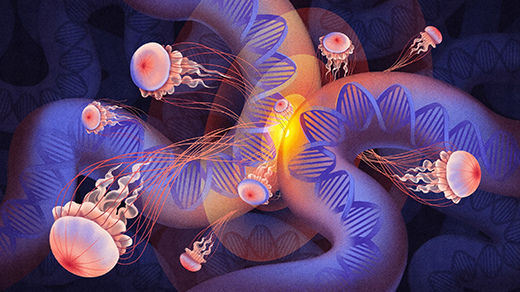You are looking for
Advanced search
Complex Animals Led to More Oxygen, Says Maverick Theory
...Darwinian evolution needed time to arrive at that tipping point. “The gene regulatory network to build an animal is the most complex algorithm that evolution has ever produced,” he said....
What’s in a Name? Taxonomy Problems Vex Biologists
...Even if phyla were defined on the basis of evolutionary timing, deciding which point in the evolutionary process to use would still be arbitrary and anthropogenic. “If you want to...
Brain-Signal Proteins Evolved Before Animals Did
...language with which neurons speak to each other. But when evolutionary biologists tried to deduce which animal cells first started to use that language, the murkiness of early animal evolution...
What Is Life?
...Not think about chemistry or geology or physics or astronomy, biology as separate things. But it’s one interconnected web, in which we see this amazing process of evolution, evolution of...
A Mutation Turned Ants Into Parasites in One Generation
...evolution of these weird, workerless social parasites,” Kronauer said. The Strength of Supergenes Little is known about the evolutionary history of the supergene on chromosome 13 that confers the social...
The Physics of Cold Water May Have Jump-Started Complex Life
...his idea over the years but was otherwise uninvolved with the work. The field is overflowing with papers about triggers for the evolution of animal multicellularity that draw on geochemical...
Loops of DNA Equipped Ancient Life To Become Complex
...unicellular ancestors — before evolution had even thought of metazoans, so to speak. It’s not at all obvious why that should have been so; evolution has no universal direction, no...
A New Physics Theory of Life
Jeremy England, a 31-year-old physicist at MIT, thinks he has found the underlying physics driving the origin and evolution of life. Save Why does life exist? Popular hypotheses credit a...
Fragile DNA Enables New Adaptations to Evolve Quickly
If highly repetitive gene-regulating sequences in DNA are easily lost, then that may explain why some adaptations evolve quickly and repeatedly. Evolutionary biologists have puzzled over why nature, with vast...








